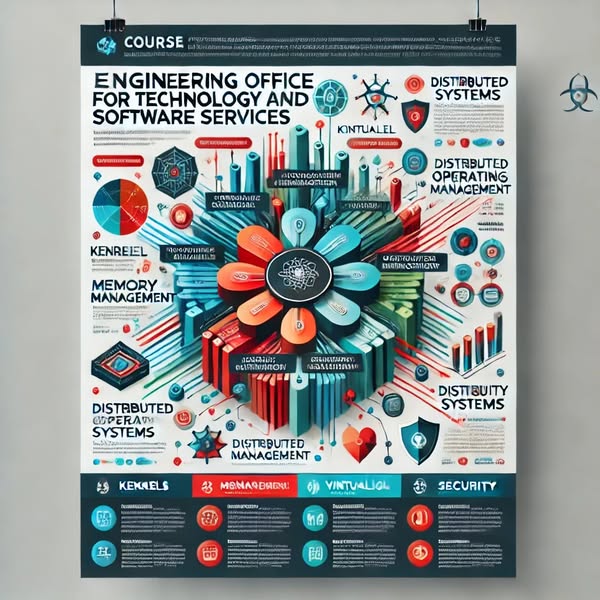
About Course
Advanced Operating System
Code: 27024-COs
Introduction
This course explores the internal design and advanced functionalities of modern operating systems, delving into concepts beyond traditional OS knowledge. Topics include process and memory management, security, virtualization, distributed systems, and kernel-level programming.
Description
Designed for learners with a solid OS foundation, this course focuses on advanced system-level topics that underpin high-performance computing, cloud platforms, and secure system architectures. Real-world applications, hands-on labs, and projects are emphasized to reinforce technical depth.
Objectives
-
Understand the core differences between traditional and advanced OS
-
Master advanced process scheduling and synchronization techniques
-
Dive into memory management, virtualization, and file systems
-
Explore operating system security, access control, and protection models
-
Apply theoretical concepts through practical labs and system-level programming
Outlines in Detail
Module 1: Introduction to Advanced Operating Systems
-
Definition and importance of advanced OS
-
Comparison with traditional OS
-
Examples: Linux Kernel, Windows Internals
Module 2: Process Management
-
Processes and threads
-
Advanced scheduling algorithms
-
Synchronization and race condition handling
Module 3: Memory Management
-
Virtual memory management
-
Allocation strategies
-
Paging and segmentation
Module 4: File Systems
-
File system design principles
-
Storage strategies (journaling, caching)
-
File system security and protection
Module 5: Security & Protection
-
OS-level security models
-
Access control mechanisms
-
Privilege and permission management
Module 6: Virtualization
-
Concepts of virtualization
-
Virtual machines and hypervisors
-
Containers vs. VMs
Module 7: Distributed Operating Systems
-
Introduction to distributed OS
-
Process and memory management in distributed environments
-
Communication protocols and synchronization
Module 8: Practical Applications & Projects
-
Building a mini kernel using simulators
-
OS performance analysis using advanced tools
-
Developing low-level system programs
What You Will Learn
-
Differences between classic and modern OS
-
Design and analysis of advanced scheduling algorithms
-
Hands-on experience with virtualization and containers
-
How distributed OS handle memory and processes
-
Secure OS architecture and file system design
-
System-level programming and kernel simulations
Target Audience
-
Computer Science and IT graduates
-
System administrators and developers
-
OS and kernel enthusiasts
-
Professionals interested in low-level programming and virtualization
Materials
-
Lecture slides and reading handouts
-
Access to Linux simulators and VMs
-
Advanced debugging and monitoring tools
-
Code samples and performance profiling utilities
Instruction Methods
-
Advanced lectures with real-world use cases
-
Live demonstrations on Linux systems
-
Hands-on labs with kernel modules
-
Group projects and collaborative analysis
-
Quizzes, coding challenges, and case studies
Time Frame
Duration: 8 Weeks
Sessions: 2 sessions/week (2.5 hours each)
Total Hours: 40 hours
Course Format
-
In-person / Live Online / Hybrid
-
English language instruction
-
Practical labs and kernel-building tasks
-
Final project submission with system-level code review
Learning Outcomes
By the end of this course, participants will be able to:
✅ Analyze and optimize advanced OS performance
✅ Implement synchronization and memory techniques
✅ Compare and utilize VMs and containers
✅ Work with distributed OS principles
✅ Write and test low-level system programs
✅ Demonstrate secure, virtualized, and scalable OS behavior
Course Content
Student Ratings & Reviews



